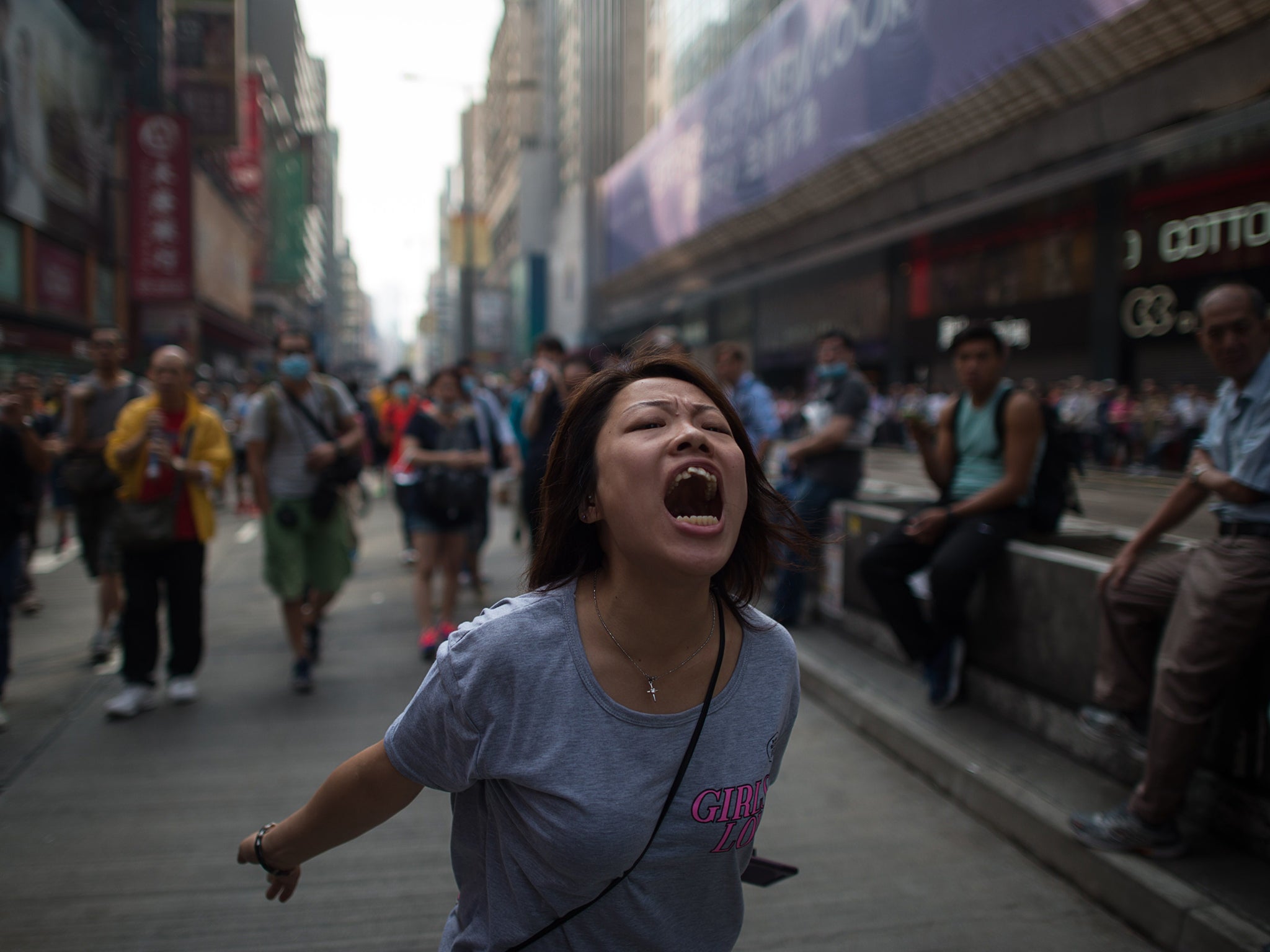Hong Kong protests: Calm before the new storm on the barricades with demonstrators ready to continue
As the pro-democracy is bolstered by a timely growth in numbers on the streets, James Legge reports from the barricades and finds protesters keen to continue – and desperate for authorities to meet them half way

For a brief moment today it appeared as if the mass protests that have transformed Hong Kong may be quelled.
But tonight violent clashes returned to the city’s streets as hundreds resisted the authorities’ most aggressive attempts yet to clear them away.
Pro-democracy occupiers held up umbrellas to defend against pepper spray and batons in Mong Kok, a shopping district away from their central camp at Admiralty. The skirmishes came after a clearance had re-opened one half of the arterial Nathan Road, but left the other half occupied by people and tents. The earlier partial clearance – less than 24 hours after the city’s leader offered talks with student leaders – only served to rally protesters to the site in greater numbers than before.
Last night police officers were seen retreating from protesters in Nathan Road. The past few days had seen similar moves against the protests’ barricades in the early hours, when numbers were low because people needed to sleep or go to work. But on a Friday evening, with thousands on the streets, and thousands of passers-by, police efforts were less succesful.
Hundreds of officers, many wearing shields and riot helmets, lined up to pen in the crowd. They also lined the central reservation, to protect traffic along the newly re-opened carriageway. Some passengers on passing buses made thumbs-down and middle-finger salutes to the throng. Others waved and cheered. Most just took photos.
But after one attempt to disperse the crowd, involving pepper spray, officers had to close the whole road to traffic again. Police then moved in on the protesters, who mostly backed away without resistance. Some, however, did resist and police used their batons with apparent freedom. One man was bleeding from his forehead as he was carried to a police van, moments after he was forced to the ground by officers.
As midnight approached, a tense stand-off was in place, with hundreds of umbrellas – which are a protest symbol – all that separated frontline protesters from another police charge. In a statement, the force condemned protesters and accused them of “endangering public order and public safety”. “They wilfully blocked major thoroughfares, charged police cordon lines and shoved police officers to the ground,” the statement added.
Only the previous evening, Hong Kong’s Beijing-backed Chief Executive, Leung Chun-ying, offered to open dialogue with the movement’s leaders, who are riled by China’s plans for the election of his successor. Under the proposed framework, a committee which detractors say is filled with Beijing loyalists, will be used to effectively screen out troublesome candidates.
Anger grew earlier this month after police used tear gas and pepper spray against initial peaceful protests. That Thursday’s offer of talks was followed so quickly by police action further fanned the crowds’ anger. Occupy Central, the group which started the series of mass occupations in the city, said they were a sign of Mr Leung’s “despotic manner”.

In a statement, Occupy Central said: “If the government does not agree with the students’ position, it can rebut them during the dialogue. It is unreasonable for the government to require the students to first abandon their positions before engaging in dialogue.” And Alex Chow, leader of the Fedearation of Students, also expressed his bemusement. According to the South China Morning Post, he told the crowd at Admiralty: “They said they want to resume talks, but then they swept away the streets today.”
One protester at Mong Kok, Jordan Ho, told The Independent that yesterday had seen a “sleazy attack”, intended to clear the streets. He said the government “wanted to disperse people so they can say: ‘You’ve got no chips. You’ve got no bargaining power’.”
The protests are the biggeest challenge to Chinese rule in the territory since it was handed over from Britain in 1997, and the biggest nationally since the Tiananmen Square protests of 1989. Some of the city’s great and good have voiced concern over damage to the Asian business hub’s image. And yesterday the Hong Kong Association of Banks (HKAB) said the portests, “which have lingered on for days,” were adversely affecting people’s lives.
In a statement the group, which represents local financial institutions, said: “HKAB calls for an immediate end to the protests to allow those affected by the disruption to recover and help Hong Kong preserve its competitiveness and maintain international investor confidence.”
Join our commenting forum
Join thought-provoking conversations, follow other Independent readers and see their replies
Comments
Bookmark popover
Removed from bookmarks